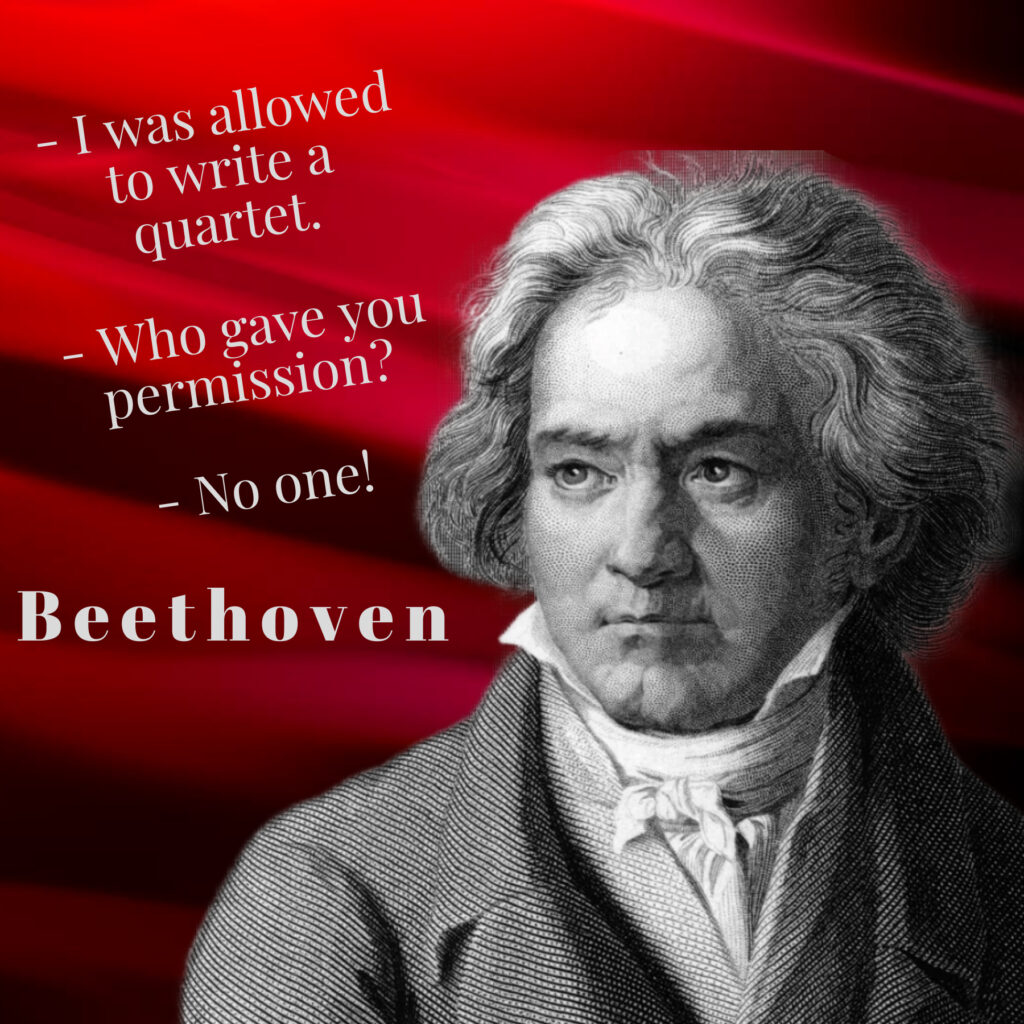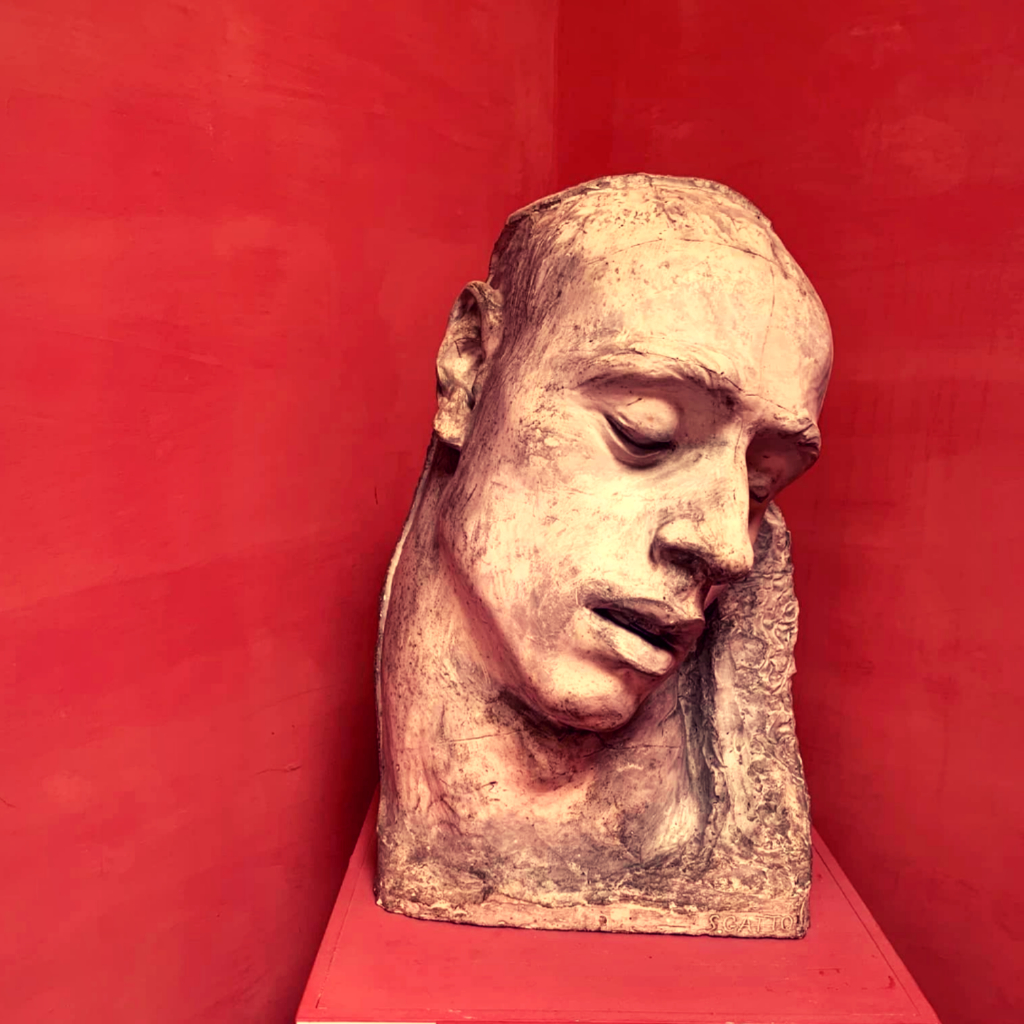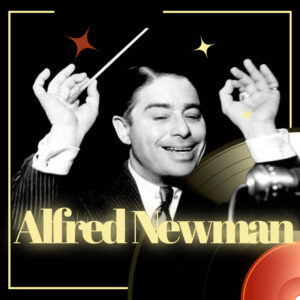
How is Beethoven different from all the other composers? In our opinion, he was not quite a composer. Beethoven was a cultural hero.
Beethoven’s contemporary composer Ignatz Moscheles described him as: "He was short, stocky, I might add, almost athletic build. The face is wide, brick and red - only on the slope of the years the color of the skin has become yellowish, painful, especially in the winter when he sat in four walls, away from his favorite fields. The forehead was powerful, it was bumpy. The hair, unusually thick and black, did not seem to know the comb: they were sticking out in all directions - "Medusa snakes". His eyes were glowing and astonishing. However, many were mistaken about the color of his eyes. They shined so furiously on his dark, tragic face that they used to seem black, they were actually not black, they were gray-blue. Small, very deeply planted, they, under the influence of anger or passion, suddenly revealed themselves widely and rapidly, with quick looks in all directions, in which the thought was miraculously complete and truthful. Often, they would rush to the sky. His nose was short, broken, wide - hence this resemblance to a lion. A thin mouth, however, the lower lip was slightly given out. Powerful jaws that could crush walnuts. There was a deep fovea on the right chin, which made his face strangely asymmetrical. "He had a kind smile. His laughter, on the other hand, was unpleasant, abrupt, exhausted and detached" - the laughter of a man who was not accustomed to being happy. The usual expression on his face is "terminal grief".
A cultural hero is a mythological hero. The biographical material about Beethoven mainly consists of myths: Father wakes up little Beethoven and forces him to music until morning; Beethoven tears up the first sheet of the score of the Third Symphony dedicated to Bonaparte; Beethoven and Goethe in the Greenhouse (the scene is said to be told to Beethoven in a letter to Bettina Brentano, but perhaps the letter is falsified by her); Beethoven plays (of course, the Lunar Sonata; she has been shown by psychology to have medicinal tranquillising properties); a comforting mother whose son has died (this episode in all its sweet sentimentality is brilliantly shown in the film «Beethoven’s Great Love» (1936), where the protagonist played by Harry Bohr, a wonderful French actor.
The Heiligenstadt Will, whose status as a document is unclear; The Immortal Lover (it is still unknown who the woman was or if she was at all). In other words, biographical material about Beethoven is most often (especially it concerns memories of Ferdinand Ries), the most vivid and psychologically reliable anecdote collections.
The anecdote bears much resemblance to myth as a universal neutraliser of opposition.
The railhead in 1825 admitted that he had a great deal of difficulty in keeping his tears, seeing “his meek eyes, which were filled with unbearable anguish”. A year later, Braun von Braunthal meets him in a tavern: he sits alone, in a corner, a long pipe smokes in his teeth, and his eyes closed – a habit that was seen increasingly towards the end of his life. One of his friends is talking to him. He smiles sadly, takes out a small notebook – a “spoken” – and a piercing voice, as often spoken by deaf people, asks him to write what he is being asked. In the moments of inspiration that struck him truly unexpected, sometimes even when he sat alone at the piano. “The muscles of his face strained, his veins swelled, his furious gaze became truly formidable, his lips too, his face turned, astonishing passers-by. Sometimes, when they trembled, he looked like a magician who had been defeated by demons he had summoned himself. The Shakespeare character, “King Lear,” said Julius Benedict.
The gesture of permission is an element of deontic modality. Usually people are allowed something by someone else – the father, the traffic light, the police officer.
– I was allowed to write a quartet.
– Who gave you permission?
– No one!
He allowed himself. It is an act of divine will of Homo Scriptor.
But in the days of Beethoven, there were no real modalities. Time before romanticism is not postmodernism. Yes, so do it. Beethoven is a man who’s allowed too much – first to himself, then to others. As a result, music, according to Anton Webern, began to allow itself too much, that at the end of the XIX century led to chaos atonality, and there was a need for «prohibitive» music of the new Vienna school.
But Beethoven stood over the music, though he did not seem to understand this, appearing to continue to be a musician. When someone cried over his performance, he was angry: “We are musicians, we do not need it, we demand applause”.

Here are five surprising facts that you might not know about this legendary composer!
1) He was actually the third Ludwig van Beethoven in his family.
That famous quote attributed to Beethoven — “There are and will be a thousand princes; there is only one Beethoven”—isn’t exactly true.
The first Ludwig van Beethoven was the composer’s grandfather, a musician in Bonn, and the second was Beethoven’s older brother, who passed away a few days after his birth.
2) He studied with Mozart’s teacher — Franz Joseph Haydn.
After Beethoven moved to Vienna in his early 20s, he started taking lessons with Haydn, often called the father of the symphony.
Haydn also taught Mozart, one of Beethoven’s early idols. (Beethoven had earlier made a visit to Vienna to try to take lessons with Mozart, but we don’t know if they actually met.)
Although Haydn and Beethoven would often clash and argue, Beethoven nevertheless dedicated his Piano Sonatas, Op. 2 to his teacher.
3) He was unlucky in love.
Beethoven first fell in love with a young countess named Julie (“Giulietta”) Guicciardi in 1801, but could not marry her because he was a commoner. His famous Piano Sonata No. 14, “Moonlight,” is dedicated to her.
A few years later he met and fell in love with Josephine Brunswick, another countess, after he began giving her piano lessons in 1799. They would write a series of love letters, of which 15 by Beethoven survive, until her family pressured them to terminate the relationship.
4) We don’t really know why he became deaf.
Beethoven started to lose his hearing when he was 26 years old and by the last decade of his life it was completely gone.
Although there are many theories about why Beethoven lost his hearing, we don’t really know what caused it.The most likely causes might be a disease from his early childhood like typhus or small pox.
5) He died during a thunderstorm at age 56.
Beethoven passed away on March 26, 1827 after a long illness, his friend comparing the moment to the composer’s symphonies with “crashes that sound like hammering on the portals of Fate.”
We don’t really know Beethoven’s final words, although his friends and biographers have recorded many different versions including “Pity, pity — too late,” or “Applaud, my friends, the comedy is over” and “I shall hear in heaven,” a reference to his deafness.



